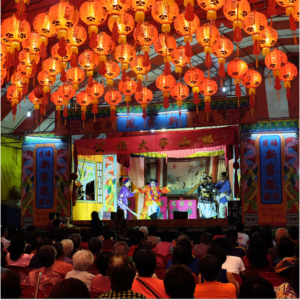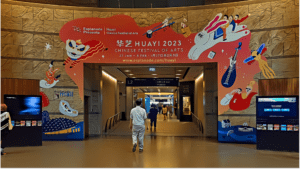18 year-old Chenxi Zhang considers the future of this historical but neglected art form

March 4, 2024. Sin Sai Hong, the oldest Hokkien opera company in Singapore, holds its last performance.
July 4, 2024
Can traditional Chinese opera survive in pragmatic Singapore?
In a quaint teahouse nestled on Smith Street in Chinatown, the Chinese Theatre Circle hosts their weekly workshop, ‘The Sights and Sounds of Chinese Opera’.
Opera teacher Mrs Joanna Wang and her disciple, Miss See Too Hoi Siang, explain performance techniques such as ‘water sleeves’ and the diverse roles of Chinese opera characters through makeup. The session culminates in an exciting Cantonese opera duet by another group of seasoned performers.
Both women are well-known performers of Cantonese opera, showcasing this art form in major cultural festivals at home and abroad. They also host daily karaoke concerts for aficionados at the opera-themed teahouse – the first of its kind in Singapore.
The origins of Chinese opera date back to the Tang dynasty (618–907). The most popular genres include Peking opera, Kunqu opera and Cantonese opera, which are distinguished by their respective regional dialects.
Some genres are more lyrical, others focus more on the martial arts aspect, but the role types remain the same across genres, that being ‘Sheng’ (male roles), ‘Dan’ (female roles), and ‘Chou’ (a clown role that adds humour to the story).
The intricacies of Chinese symbolism are woven into its costuming and instrumental accompaniment. “The dragon, as a symbol of royalty, refers to the king,” See explains. “The phoenix is a symbol of the concubine.”
In Singapore, Chinese opera performances are especially popular during major cultural events such as the Huayi Festival held at Chinese New Year.
On February 18 the DBS Foundation Theatre overflowed with eager audiences awaiting the ‘Appreciation of Chinese Opera’ event at this years festival. They were treated to an outstanding rendition of the classic The Peony Pavilion, performed by the Chinese Opera and Drama Society.
Characterised by its lyricism and elegant gestures, this timeless tale narrates the passionate love affair between Du Liniang and a scholar, set in her dreams. The lovers sang passionately to each other in the Wu dialect, which was translated into both Mandarin and English on large screens that flanked the stage.
Thanks to the translation, language was less of a barrier in terms of attracting attention from the audience. Some viewers told Harbingers’ that, while they might not be able to understand everything given the nuances of Chinese rhymes and its inaccurate English translation, they could decipher the plot from the emotions conveyed by the performers.
A dying art form
The problem is that Chinese opera is a dying art form in Singapore. The number of Chinese street opera troupes has dwindled drastically from hundreds to about ten, according to CNA Insider.
Tragically, by 2022, the street opera troupe featured in the video, Xiao Dong Tian Hokkien Opera, had also disbanded.
The main reason for this is that both the performers and audience are elderly. Most of the performers are over 50 years old, and many Chinese opera troupes rely on outdated social media such as Facebook for advertisement – only 3% of Facebook users in Singapore are aged 13–17.
Many troupes don’t even have a website and only expect friends and families to turn up to their performances.
This results in a homogenised and elderly audience, with most Chinese youths paying little to no heed to this dying art form.
Mrs Wang also lamented the language barrier caused by the use of regional dialects adding how “more and more younger people stop speaking the dialects. Also, they will not go the extra mile to make sense of the performance through gestures and facial expressions.” She told Harbingers’ how they plan to hold performances in English, hoping this would pique the interest of younger audiences.
Recognising the urgency of youth engagement, Singapore’s Traditional Arts Centre promotes Chinese opera through a variety of initiatives, including lessons for young people and performing adaptations of a popular animated film Nezha Conquers the Dragon King at primary schools. They also hold street demonstrations in Chinese opera costumes.
The problem is that Chinese opera is excluded from Singapore’s compulsory arts education and underappreciated in the bilingual curriculum, so young children get little exposure to it. Parents also tend to prioritise sending their children to enrichment programmes that offer certification and valid credentials over Chinese opera.
Arts education has also taken a back seat behind STEM subjects in Singapore’s deeply pragmatic society. A 2021 survey reported that a whopping 64% of Singaporean respondents wanted to pursue a STEM career, due to higher pay and greater job stability.
With the arts scene languishing in popularity, young people are unlikely to consider Chinese opera as a plausible career, deterred by the time and financial investment required without promising returns.
Tang Renaissance
In April, Shanghai Yue opera company Tang Renaissance staged a performance called Five Daughters Celebrating Grand Birthday, with all 500 tickets sold out.
Performers came from diverse backgrounds – professionals who have transitioned from other genres such as Beijing Opera, and part-time enthusiasts who perform for leisure. The performance was of the highest standard and was met with a standing ovation.
But it was a tough job putting the performance together. Rehearsals took months and the budget was in the tens of thousands of Singapore dollars. Madam Foo Kok Wan, executive director of Tang Renaissance, said that the troupe was extremely privileged to get a live orchestra, rather than relying on karaoke.
Afterwards, performers gathered to reflect on their performance. Despite some challenges, including uncomfortable costumes and minor mistakes, they were heartened by the audience’s positive reception.
Tang Renaissance is one of the few Yue opera troupes to receive the National Arts Council’s Performance & Producing Grant, which is issued to just 40% of the 400 performing organisations who apply for it. The grant supports performances or narratives that cater to unique Singaporean identities or modern themes. Despite this the funding Tang Renaissance receives is tiny compared to professional performing troupes in China, so the company gives its all towards the one or two performances they can put together each year.
As a result, Chinese opera companies have had to innovate to keep up with the changing culture and tastes of the younger generation. Most of the troupes who did not get a grant ended up merging or disbanding altogether.
Many barriers still stand in the way of Chinese opera’s survival – lack of publicity, difficulty in securing funding, and lack of public interest. The truth is, this art form needs fresh blood.
Many companies are eager to engage interested youths, teach them from scratch, and even give them opportunities to perform on stage. They are trying to bridge the lack of understanding by incorporating more modern themes, and even switching to Mandarin or English.
With an open mind and more support, there may be hope for the future of Chinese opera in Singapore.





